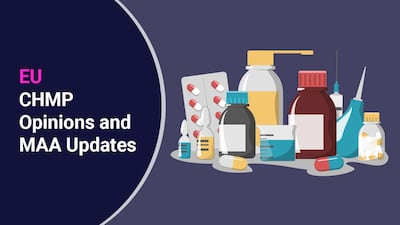EU CHMP
The European Medicines Agency has recommended new uses for nine approved medicines, including Incyte's immunotherapy Zynyz which is poised to become the first EU treatment for squamous cell carcinoma of the anal canal.
The EMA has voted in favor of EU approval for five new products, including treatments for a rare, life‑threatening genetic disorder and for non‑cirrhotic MASH, and has also recommended reversing its earlier rejection of an orphan drug for chronic graft‑versus‑host disease.
The European Medicines Agency said that Sanofi’s Rezurock should be approved on a conditional basis for patients with chronic graft-versus host disease after reconsidering its initial decision not to recommend the drug.
The European Medicines Agency is set to adopt opinions on whether marketing approval should be granted to five new products, including therapies for a serious liver disease and an ultra‑rare genetic mitochondrial disorder.
In 2025, 43 drugs containing new active substances (NASs) were approved in the EU, and 2026 has already seen three NAS approvals with more expected soon. Also, for 1H 2026, the EU regulator has received 84 letters of intent for marketing applications for new drugs, of which 58 contain NASs.
Zidebactam/cefepime, Wockhardt's novel antibiotic treatment for resistant Gram-negative infections, is among the latest products that have been filed for review by the European Medicines Agency for potential EU marketing approval.
This is an update of recommendations from the European Medicines Agency's Committee for Medicinal Products for Human Use on the authorization of new medicines in the EU, and updates on EU marketing authorization changes recommended by the CHMP.
The European Medicines Agency has said that Anavex’s Alzheimer’s candidate should not be authorized for use in the EU due to safety and efficacy concerns. Seven other products, including two new cancer drugs, received positive opinions.
The European Medicines Agency scheduled oral explanation meetings for Sanofi’s MS drug and two other products nearing the end of their EU regulatory review cycle. These meetings typically give companies a final chance to convince the agency their drugs merit approval.
Seven new products, including Anavex’s Alzheimer’s candidate and GSK’s add-on asthma therapy, are up for an opinion from the European Medicines Agency on whether they should be authorized for use in the EU.
Denecimig, Novo Nordisk’s prophylaxis treatment for hemophilia A, is among the latest products that have been filed for review by the European Medicines Agency for potential EU marketing approval.
The European Medicines Agency has begun evaluating the EU marketing applications for a new batch of drugs, including products from Incyte, Sanofi and Novo Nordisk that target hidradenitis suppurativa, rabies and hemophilia A, respectively.
This is an update of recommendations from the European Medicines Agency's Committee for Medicinal Products for Human Use on the authorization of new medicines in the EU, and updates on EU marketing authorization changes recommended by the CHMP.
Ohtuvayre is off to a great start in the US but Verona's new owner MSD has pulled the EU marketing application from the European Medicines Agency for the closely-watched chronic obstructive pulmonary disease drug.
While the European Medicines Agency’s human medicines committee voted in favor of EU approval for 10 new products, it reaffirmed its previous decision not to grant Aqneursa new active substance status.
The European Medicines Agency has recommend approving Teizeild, paving the way for the first disease modifying treatment for type 1 diabetes in the EU.
The EMA has scheduled oral explanation meetings this week for Anavex’s blarcamesine and three other products that are nearing the end of the regulatory review cycle. These meetings usually represent the final chance for sponsors to persuade the agency that their product merits approval.
The sponsors of a number of drugs could this week learn whether the European Medicines Agency will recommend in favor of approving their products. And while teplizumab was approved in the US in 2022, Sanofi told the Pink Sheet why it waited to submit the drug for regulatory review in the EU.
This is an update of recommendations from the European Medicines Agency's Committee for Medicinal Products for Human Use on the authorization of new medicines in the EU, and updates on EU marketing authorization changes recommended by the CHMP.
The European Medicines Agency’s human medicines committee, the CHMP, has recommended Insmed’s Brinsupri and Sanofi’s Wayrilz for pan-EU approval but turned down Sanofi’s Rezurock based on trial results that cast doubt on the drug’s efficacy.

















